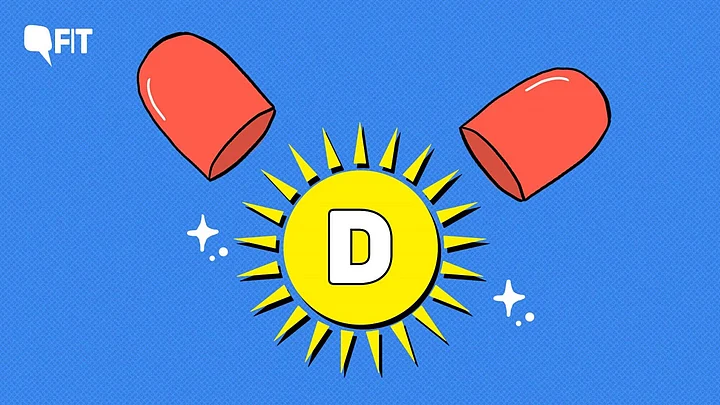When Riya*, a communications professional from Bangalore, first started feeling extreme fatigue, she wasn’t sure what it meant. She was constantly sleepy to the point that no amount of sleep was enough, had severe hair loss, and was having palpitations. What she first assumed was a mental health issue, turned out to be a vitamin D deficiency.
Her blood test results shocked her doctor, who asked how she was even managing everyday chores with such low vitamin D levels. Riya’s doctor prescribed her injections for four weeks, followed by oral supplements, changes to her diet, and a 30 minutes walk in the sun every day.
Like Riya, a lot of people have recently been getting tested for vitamin D deficiency, especially after two years of COVID-19 pandemic.
Dr Priyanka Rohatgi, the chief nutritionist at Apollo Hospital, told FIT that she isn’t sure if vitamin D deficiency is on a rise right now, or if it’s just that more people are finally getting tested and diagnosed with the deficiency.
Symptoms of Vitamin D Deficiency
If you’re not sure when to consult a doctor or get your vitamin D levels tested, here are the symptoms to look out for:
Lethargy
Muscle weakness
Muscle loss
Weak bone density
Low bone health
Poor wound healing
Depression
Mood fluctuations
Increased diabetic/pre-diabetic blood levels
For Prateek Lidhoo, a media professional from Delhi, lethargy was the first sign of vitamin D deficiency. Two years ago, his psychiatrist had recommended getting a vitamin deficiency test done since his sleep schedule was all over the place. After an eight week course, Lidhoo was back on track.
However, a few months ago, a lack of energy in every day life forced Lidhoo to get the test done again. He found that this time around, the vitamin levels had gone further down.
For him, a proper schedule, physical activities, and vitamin D supplements are helping him maintain a healthy limit.
Who Should Get Tested?
According to Dr Sanjay Agrawal, an orthopedic, there are three types of people who might lack adequate vitamin D and should get tested:
People who’ve been feeling weak or generally tired for days at a stretch
People who do not get enough exposure to sunlight (be it people working from home, from closed office spaces, or people who are fully covered when they step out in sunlight)
People who live in polluted cities (pollution limits the ultraviolet rays of sunlight from directly reaching the earth’s surface, explains Agrawal)
What Are the Acceptable Levels?
If our vitamin levels are in single digits, oral supplements alone won’t do. Injections, transfusions will be required. If the levels are between 10-40, supplements would work.
Getting your vitamin levels checked regularly, and maintaining them in double digits should be a conscious endeavour towards better health.
However, Agrawal warns, don’t take vitamin D supplements just because.
"Since it’s a fat-soluble vitamin, excess of it might be poisonous to the body. Additionally, if you have a problem in your kidney, try not to take oral supplements since it’s the kidney that converts vitamin D into the chemical that your body actually requires," he shares.
What Doctors Suggest
Speaking to FIT, Rohatgi suggests that people get their vitamin levels tested annually, along with their regular check-ups.
If a vitamin deficiency is detected, she insists that after the eight-week correction dose, a maintenance dose is taken regularly to keep the vitamin levels in check.
“This is a vicious cycle people get stuck in because they don’t maintain the vitamin levels,” she says.
Post-Pandemic Aggravation
This isn’t the first time that Riya got diagnosed with a vitamin D deficiency. But six years ago, when it first happened, the intensity wasn’t this severe, and taking oral supplements worked. This time around, she thinks the severity is pandemic-induced.
Rohatgi agrees. She says:
"Physical activity had gone down during COVID, people were consuming a lot of ultra-processed food, and there was little to no exposure to sunlight, so definitely vitamin D levels went down in people. The problem was also aggravated because of long COVID and post-COVID problems."
But the nutritionist adds that the problem cannot be solely attributed to the pandemic. Both Agrawal and Rohatgi emphasise the importance of a balanced diet.
Rohatgi adds, "With a lot of people moving towards veganism, elements like milk and fish are not being consumed anymore. But people should make an effort to compensate and have a balanced diet, with dietary changes or supplements."
Vitamin D not only takes care of our bone immunity or the overall physical well-being of our bodies, but can affect our mental health too.
Lidhoo feels that especially in the younger generation, a lack of schedule, work-life balance, and minimal exposure to sunlight are what are driving down our vitamin levels. But, a healthy control over these can fix vitamin D levels and a lot more.
Insufficient levels of the vitamin impact our cognitive health, mood, memory, and the melatonin and serotonin levels in a lot of ways, Rohatgi adds.
*name changed

